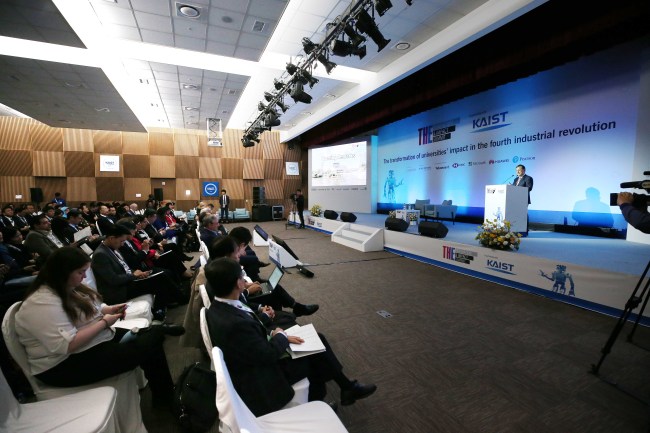KAIST placed 4th in innovation in THE University Impact rankings
By Ock Hyun-juPublished : April 4, 2019 - 15:55
The Korea Advanced Institute of Science and Technology placed fourth in industry, innovation and infrastructure in the 2019 Times Higher Education University Impact Rankings, KAIST said Thursday.

KAIST earned a nearly perfect score in patent, dissertation and research funding -- one of the specific indicators to measure its impact on society in achieving the United Nations’ ninth Sustainable Development Goal of industry, innovation and infrastructure.
New Zealand’s University of Auckland topped THE’s overall Impact Ranking, followed by Canada’s McMaster University. University of British Columbia in Canada, and University of Manchester in the United Kingdom jointly ranked third.
The inaugural THE University Impact Rankings, which recognizes universities’ impact on society based on the SDGs, was exclusively disclosed during the 2019 KAIST-THE Innovation & Impact summit Wednesday and published globally Thursday.
The three-day summit on changing roles of universities in the era of the “fourth industrial revolution” was held from Tuesday to Thursday at KAIST’s main campus in Daejeon, bringing together some 300 leaders from 25 countries in the fields of education, industry and politics.
The Impact Ranking was based on institutions’ success in delivering 11 of the 17 SDGs -- good health and well-being; quality education; gender equality; decent work and economic growth; industry, innovation and infrastructure; reduced inequalities; sustainable consumption and production; climate action; peace, justice and strong institutions; partnerships for the goals.
The ranking looks into institutional activities and efforts not covered in other rankings, with each SDG assessed across the three broad areas of research, outreach and stewardship.
This year, more than 500 institutions from 75 countries in six continents submitted data for the new ranking, according to THE.
“The indicators measuring universities’ impact should change as roles of universities diversify in line with diversifying global trends,” said Lee Jae-hyung, associate vice president of the international office at KAIST, adding it is a meaningful effort.
Since KAIST set its “Vision 2031” to position itself as a leading university in creating global values in March, it has made efforts to innovate five sectors -- education, research, technology commercialization, globalization and ultimately future strategy.
KAIST was selected Asia’s best innovative university for three consecutive years since 2016 in Reuters’ ranking of the world’s most innovative universities. The ranking recognizes educational institutions doing the most to advance science, invent new technologies and power new markets and industries.
“Taking the UN’s 17 SDGs as new indicators, KAIST, which has dedicated itself to producing knowledge that could be a growth engine for the country’s development, will become a leading university in creating global values,” said KAIST President Shin Sung-chul.
During the three-day summit at KAIST’s main campus, former and incumbent presidents of some of the world’s most prestigious universities and business leaders shared their experiences, insights and development strategies.
The participants focused on discussing four topics -- educational innovation, knowledge transfer and entrepreneurship, artificial intelligence and culture, and the Trip Helix of Innovation -- and drawing up institutions’ policy directions in Industry 4.0.
(laeticia.ock@heraldcorp.com)
-
Articles by Ock Hyun-ju








![[Kim Seong-kon] Democracy and the future of South Korea](http://res.heraldm.com/phpwas/restmb_idxmake.php?idx=644&simg=/content/image/2024/04/16/20240416050802_0.jpg&u=)








![[KH Explains] Hyundai's full hybrid edge to pay off amid slow transition to pure EVs](http://res.heraldm.com/phpwas/restmb_idxmake.php?idx=652&simg=/content/image/2024/04/18/20240418050645_0.jpg&u=20240418181020)

![[Today’s K-pop] Zico drops snippet of collaboration with Jennie](http://res.heraldm.com/phpwas/restmb_idxmake.php?idx=642&simg=/content/image/2024/04/18/20240418050702_0.jpg&u=)